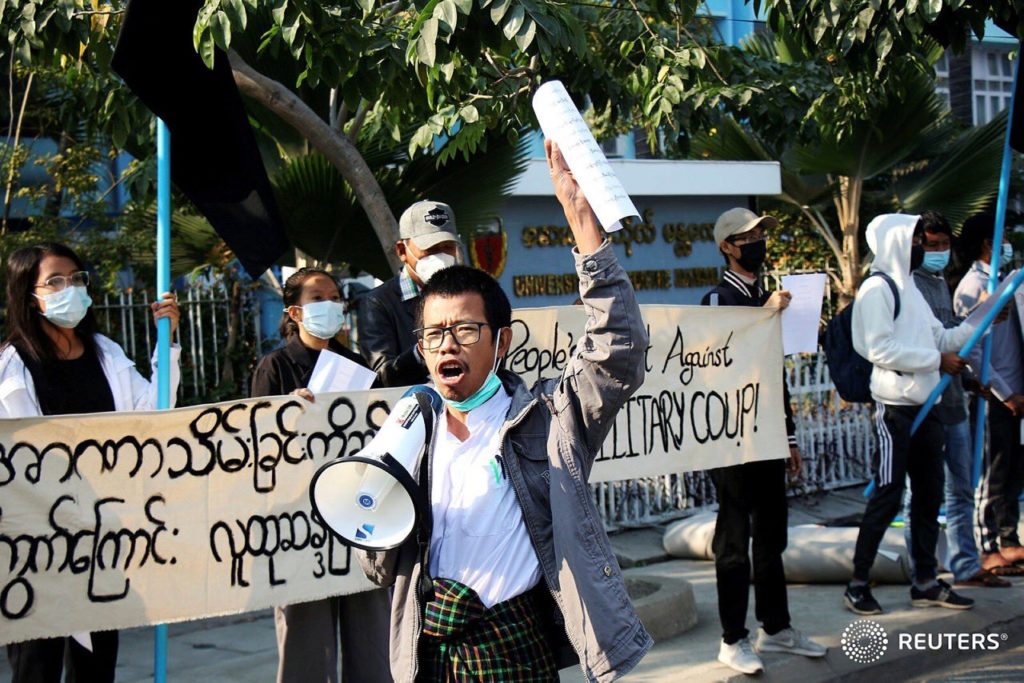
Where are we after more than 100 days since the coup?
THE COUP
When on February 1st the Tatmadaw staged the coup, General Min Aung Hlaing probably thought things would have been settled by now. After more than 3 months, the military regime has no legitimate control over the country, and has no internal support. It formed the SAC (Security Administration Council) which is now ruling through brutal force and violence.
ANTI-COUP MOVEMENT
The strategy of the anti-coup movement is currently based on 4 pillars:
- NUG: since the coup, democratic forces have been working on finding unity to oppose the junta. In April they declared the abolishment of the 2008 Constitution (which heavily favoured the military) and published a Charter for Federal Democracy. Later they formed the National Unity Government (NUG). NUG now claims to be the legitimate government, even though most of its members are in the hiding. NUG is seeking international recognition, but having a clear territory control especially in the central area will be key.
- PROTESTS: after the first few weeks in which millions of people were participating, protests have now turned into “guerilla style”, with less people, to avoid violent repression from the military. Led by the younger generations, they have been largely peaceful and have been able to get the public’s attention. There have been many creative initiatives such widely shared online. Boycott of products linked to military owned companies is one of them. Social Punishment is also one tool that is being widely used and sometimes misused as well. It’s effective when directed towards generals, high ranks and pro military people, but when directed to regular people it can backfire.
- CIVIL DISOBEDIENCE MOVEMENT (CDM): since the beginning of the coup, doctors refused to work under the regime. They were later joined by all sorts of public servants and private sectors workers. Some estimate around 70% of government workers to have joined the CDM. The goal is to not let the regime led government function.
- DEFENCE FORCES like PDF (People defence forces) and EAO (ethnic armed organisations): following the brutal violence towards innocent civilians, the need to protect the central areas of Myanmar forced NUG to create the PDF. In ethnic regions, EAOs have been fighting against the junta for decades. Most of them decided to support the democratic movement. Many call for the creation of a Federal Army.
CONFLICTS
Some foreign observers draw comparisons with Syria. At the moment the two situations seem quite different, with foreign intervention still very unlikely. But similarly to Syria, things could escalate quickly. Myanmar is home to the longest ongoing civil wars. After the coup, clashes have resumed in many areas, especially in Kachin, Karen and Chin State where the Tatmadaw carried out airstrikes. Thousands of people had to flee their villages. In Shan State clashes between TNLA and SSA-S took place. New armed forces appeared, i.e. in Sagaing and in Myingyan (Mandalay), though they have been using homemade rifles. Many explosions have been reported in cities, especially in Yangon. Protests have become less frequent.
Along with traditional EAOs a new armed force has been created by NUG: PDF (People Defence Force). People wishing to join it, have traveled to border areas to get military training by ethnic armed groups. Now most towns have a PDF presence, often armed with homemade rifles.
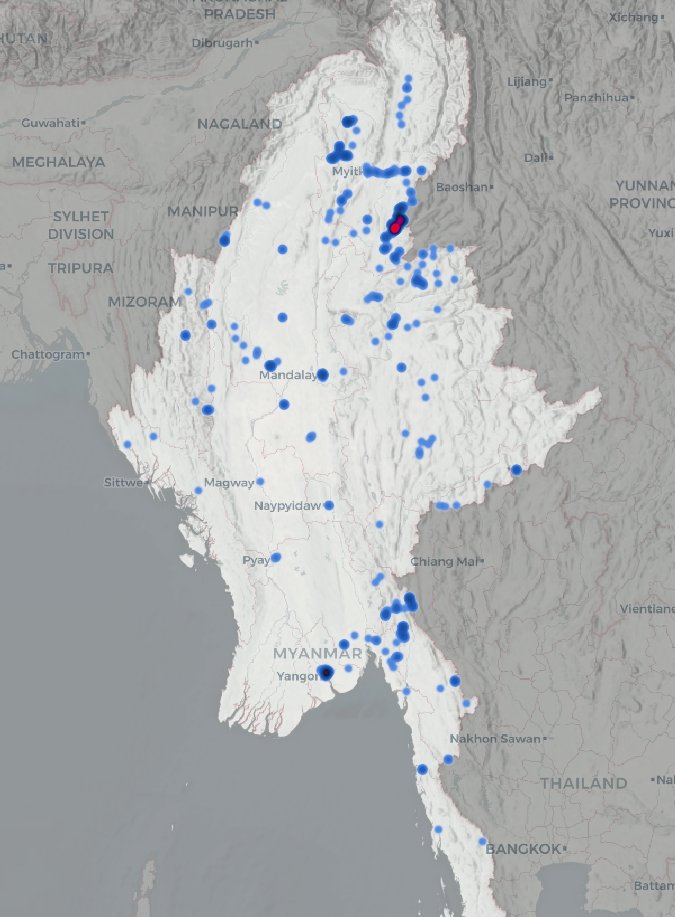
There is hope to see more Tatmadaw soldiers defecting. Some estimate that around 70% of the soldiers are willing to defect, but are not able due to safety concerns. Many soldiers have families living in military compounds, and their movements are restricted. Leaving the army would be very risky for them. There have been more defections by single soldiers especially in border areas, as it’s easier for them to reach regions under EAOs control and get protection. KIA and KNLA have been very active in fighting against the regime. AA (Arakan Army) also took part in some operations against the regime. While it didn’t endorse NUG, and there were very few protests in Rakhine, this is likely a manifestation of its pragmatic approach. Early in the coup ANP (Arakan National Party) associated with the Junta, but recently ANP chair Tha Tun Hla said it may end the collaboration.
ECONOMY
After a year of Covid Pandemic, there was some optimism in Myanmar for a quick recover, the World Bank forecasted Myanmar’s economy to grow nearly 6 in 2021. Post-coup economy is now in free fall and the World Bank now predicts a 10% contraction over the same period. CDM by striking workers has been very effective in paralyzing banking, logistics and other industries. This comes at a huge cost for Myanmar citizens. in 2020 83% of Myanmar’s households reported that their incomes had been slashed in half due to the pandemic. After the coup the World Food Programme estimated that the number of people it will assist in the next few months will triple and reach 3.3 million.
Lack of cash flow and trust is disrupting the economy. Banks are mostly closed or work reduced hours. They receive fewer deposit and more withdrawals requests. There is a fear that banks will go bankrupt so even some businesses are not depositing money anymore. People form long lines everyday to withdraw money with a limit of 200 usd, but ATMs run out of cash quickly. In some cases people are paying up to 20.000 mmk (13 usd) to “skip the line” and have a better chance to withdraw. People with no ATM have to take appointment and often have to wait up to two weeks. Some bank staffers are asking for a “cut” to gain priority. Online banking has been restored, but the situation did not change. Money transfers come at an expensive fee (up to 14%), and are often paid by both the sender and the recipient. The Myanmar Kyats’s value is hitting a record low. Before February 1st 1 USD=1330 MMK, today (may 15th) 1 USD=1560 MMK. Accessing bank loans is very difficult right now, and many people have to rely on private loans, which are very common in Myanmar. Usually interests for such loans are around 2%-6%, but after the coup, as the risks of insolvency are getting higher, some ask for 10% or even 20%.

Boycott is also one powerful tool people are using to inflict pain in the generals pockets. Many products and services in Myanmar are linked to high ranks of the military or to military conglomerates MEHL and MEC. Japanese company Kirin, which is partner with Myanmar Brewery (controlled by the military), stated that Myanmar Beer lost half of its revenue in Q1.
Even the lottery is subject to boycott. The government was forced to delay and reduce prices.
HEALTHCARE
Most doctors and nurses joined CDM and are often pressured and targeted by the junta. News of medical staff being arrested and persecuted is frequent. The few doctors/nurses that didn’t join CDM, are working under stressful conditions and are subject to social punishment by the pro-democracy movement. Some doctors resign to avoid being targeted by both the regime and the protesters. They keep working privately, often making a larger profit than before. Deaths caused by the system’s collapse are not reported, but are a sure byproduct of this coup. The combination of public hospitals not properly working and the economic crisis is dangerous for low income families who have no options to get any treatment. There is almost no Covid testing at the moment and vaccinations are halted.
EDUCATION
Most teachers joined CDM. Hundreds of them got fired by the regime. A very interesting phenomenon is the newborn student’s movement calling for a boycott of education under military rule. It will be interesting to see what happens when schools reopen in June.
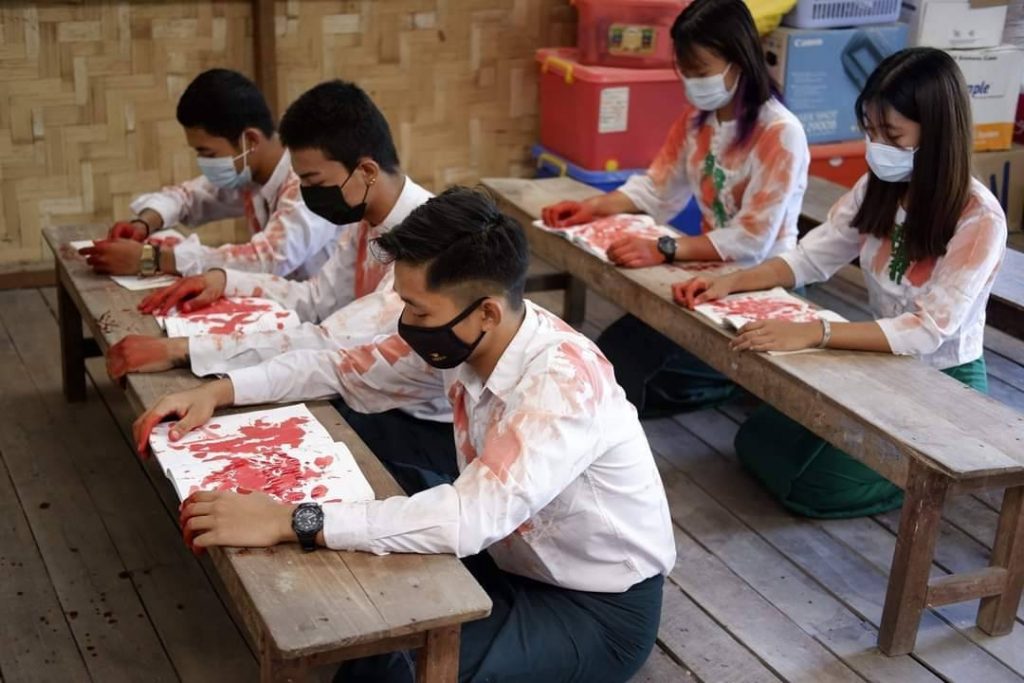
TRANSPORTATION
Due to safety concerns and fuel prices, people are not travelling freely as before. Some internal flights have been resumed.
MEDIA
The regime has revoked licenses to almost all independent news media. Offices of most popular news outlets have been raided. According AAPP, over 50 journalists are being detained right now, including a Japanese national which is said to be released soon. The junta has also ordered to remove all satellite dishes (1 year of prison and 320 usd fine for transgressors). State controlled MRTV and MWD are the only TV channels transmitting news. News outlets are now operating from abroad, especially from Thailand. 3 DVB journalists have recently been arrested in Chiang Mai, and it will be interesting to see if Thailand will deport them.
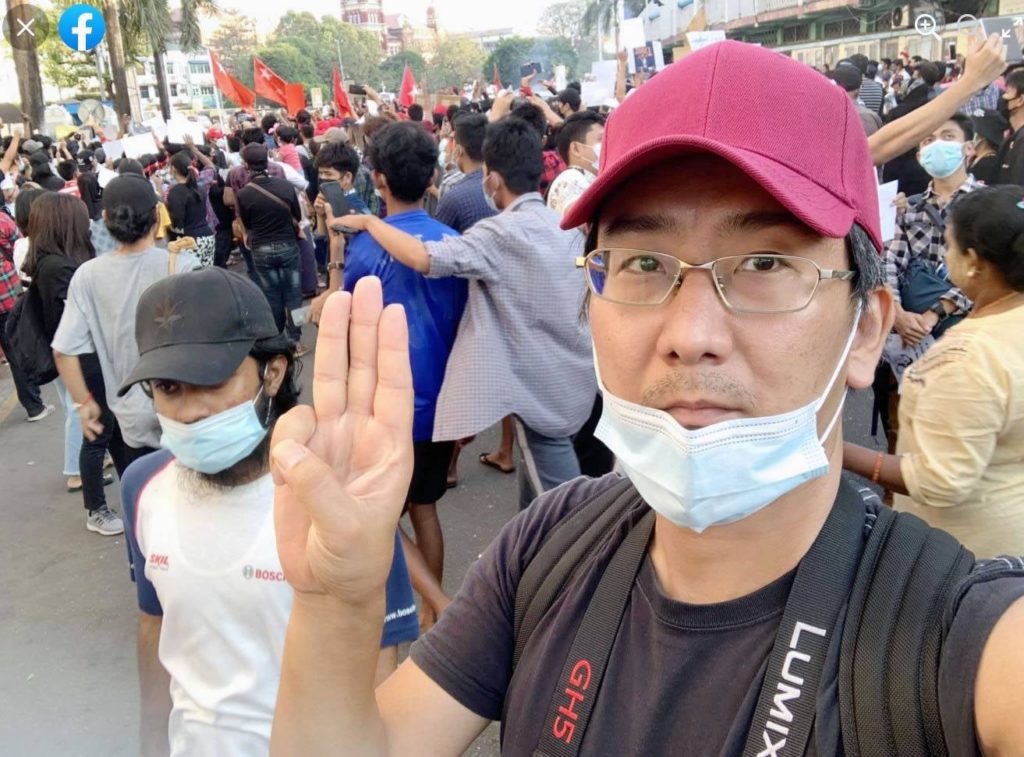
INTERNET
Internet access is heavily restricted. Mobile internet and Wireless Broadband Wi-Fi have been blocked for ~60 days. Recently some users reported that Mobile internet was working for limited apps (mobile banking). FTTH internet, which is used only by 0,5% of the population, is the only working connection. Access to popular social media such as Facebook and Twitter is banned. Only the use of a VPN can circumvent the ban. Rumors of a North Korea-style intranet are circulating. Citizens would only be allowed to access a white-list of websites and services with no free access to the rest of internet, even with a VPN. Security forces often stop young people to check their phones. If any sign of “resistance to the regime” is found, they risk arrest and interrogations.
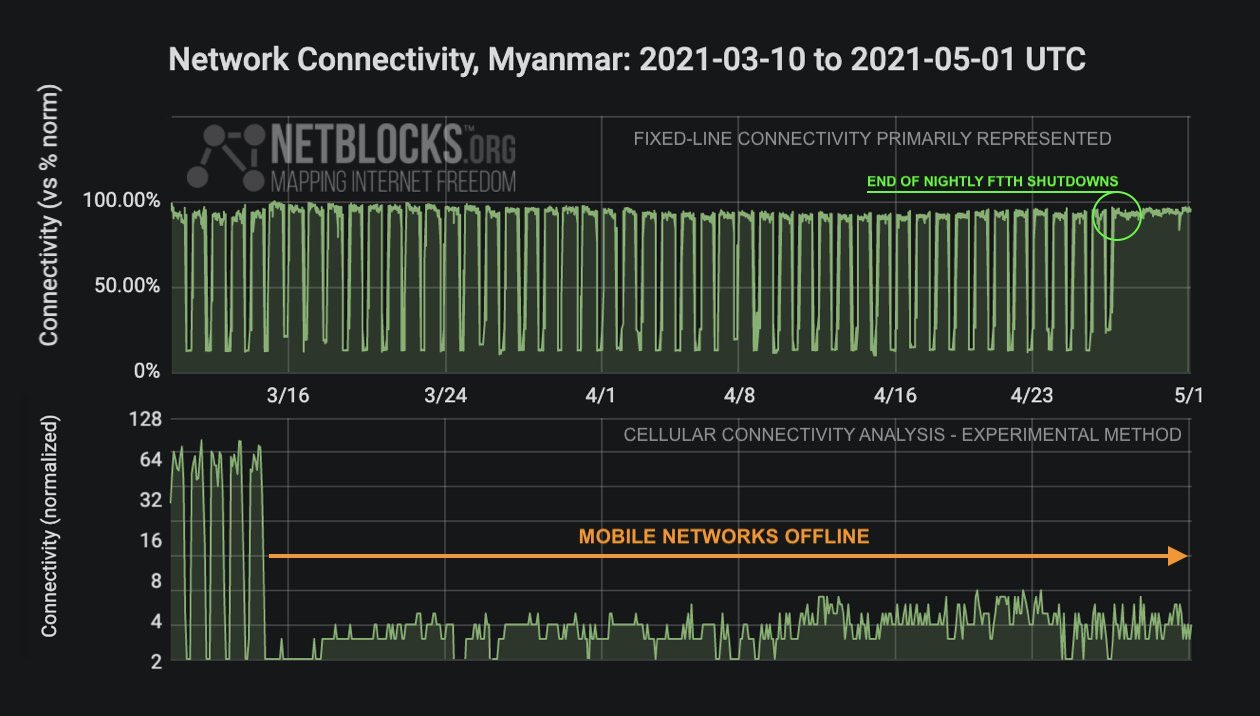
INTERNATIONAL AFFAIRS
In 3 months the international community’s response to the coup has been weak:
- the UN Security Council is far from a resolution. Russia and China veto threats seem to block any attempt to go beyond statements
- ASEAN organised a summit on April 24th dedicated to the Myanmar crisis. All countries reached a 5 points plan, but general Min Aung Hlaing failed to respect them. There has been no reaction from ASEAN so far. Countries like Thailand and Vietnam are very close to the Tatmadaw and should be considered allies. Thailand in particular is helping actively helping the Tatmadaw providing supplies, opening borders for military operation, and . Singapore has strong economic interests in this area. It is hard to think that ASEAN can be of any help.
- US has been opposing the regime since day 1. It has very little leverage, but it was able to freeze 1 billion dollars that the generals tried to take control of right after the coup. It also declared sanctions on top generals and on MEHL and MEC, the two largest conglomerates controlled by the Tatmadaw. It still didn’t sanction MOGE the national oil and gas company that is an important source of revenue for the government. Chevron is actively lobbying to avoid such sanctions.
- UK has also been opposing the regime with various sanctions. When the Myanmar’s drama at the embassy unfolded (the regime substituted its UK Ambassador locking him out of the embassy), the UK could have taken a much stronger position, but chose to accept the SAC’s decision.
- EU and Australia have been very disappointing. EU in particular has been very slow in applying sanctions. Oil french giant Total under scrutiny for being an important source of revenue for the generals. Many asked Total to stop financing the Tatmadaw to no avail.
- China has a pragmatic approach and is probably open to deal with anyone who can control the country and guarantee stability. It has huge investments in the country and its ties with the Tatmadaw are well known. While this instability is surely damaging its investments, it seems China is taken advantage of the situation by approving new big projects in Myanmar
- Japan and South Korea are also big investors in Myanmar. Their approach so far has been mixed.
- Russia main interest in Myanmar is related to arms-sales, though it also has a history of supporting anti-democratic regimes
- India has largely remained silent and ordered its regions to not accept refugees. Mizoram has not followed orders though and offered shelters to many CDMers. Mizoram is deeply tied with Chin State, sharing the same ethnic identity (Chin and Mizo).
RELIGION
Myanmar is mostly a buddhist country. Many monks and nuns have been vocal and are protesting against the regime, especially in Mandalay. The most influential monks though did not speak out though. In the first weeks there were rumours that the Mahana was opposing the coup (a document denouncing the coup was leaked on social media), but then there was no further development. While monks usually don’t speak about worldly affairs (the monastic code Vinaya prohibits taking part in politics), it’s worth to notice that the many influential ones are close to the generals. High ranks of the Tatmadaw are big donors, and there is a belief that the military is defending buddhist traditions from “western” or “muslim” influences. Monks who are taking it to the streets, instead, believe that they have an obligation to keep people on a “right and moral path”. Christian Cardinal Bo strongly condemned the violence against civilians. The Muslim community joined protests as well. Some muslim political leaders have been tortured and killed in gruesome ways, showing how racist the Tatmadaw institution is. Rohingya people have shown solidarity to the movement from across the border. There are some controversies regarding past genocide denials by some NUG ministers. American congressman Ted Lieu openly stated that the US can’t support NUG until it includes Rohingya representatives. While there have been some encouraging signs by some NUG leaders who publicly apologised, the road for a Rohingya return is still long.
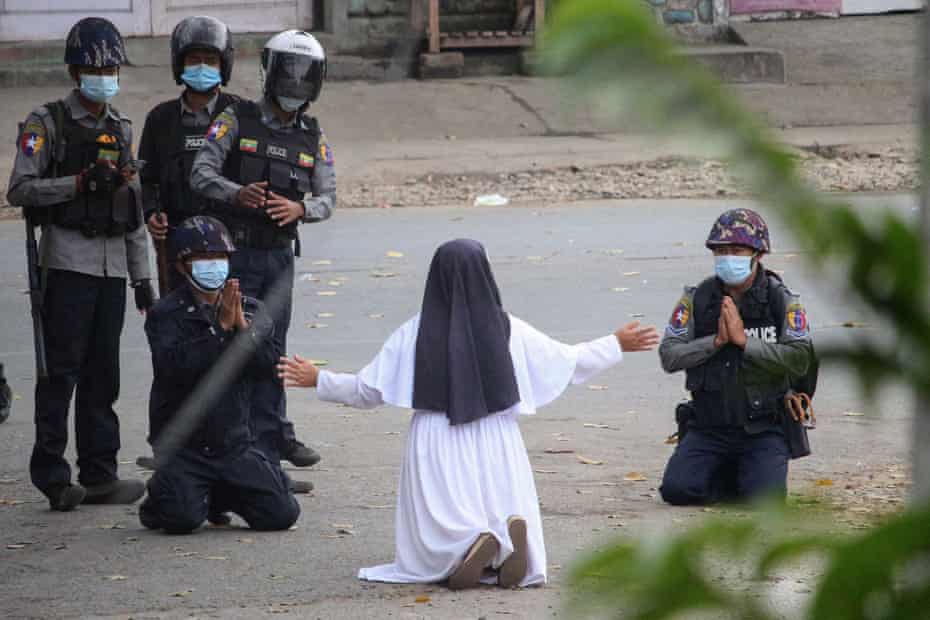
DAILY LIFE
Life in Myanmar has drastically changed. Safety has become a major concern. People are being abducted by SAC forces daily, and disappear. Some end in prison with no plausible charge or under section 505 (a) which is so vague that literally anyone could be arrested. Access to a lawyer and family visits are often denied. Interrogations and tortures are not uncommon, and unfortunately dozens of deaths caused by such practices have been reported. Martial law has been used in certain townships, including in Yangon. People and their properties can be searched with no warrant. Sexual abuse, looting and bullying by Tatmadaw soldiers have been widely documented. As PDF (People Defence Force) made its way into many towns, there is a growing fear of conflict. Soldiers are in almost every village, and drones are now flying over the heads of regular civilians.

PTSD signs are common (even though we are not in the “post” phase yet), people are afraid of the dark (when soldiers often abduct people) and often don’t sleep much. Children fear noises, sometimes they even fear protest chants.
There is a very dense network of informants (“dalan” in burmese) within the population. This is a legacy of the past that never disappeared even during the NLD rule. Every village or ward has someone who informs the military/police about what is going on in a certain area.
As of today AAPP (Assistance Association for Political Prisoners) is reporting nearly 800 deaths. The number could be higher, as many families are not reporting deaths in fear of retaliation. There have been cases of bodies that were not returned to their families, or cremated with no consent. Sometimes families are forced to sign false declarations that exonerate the military from its crimes in order to get the deceased body back and hold a proper funeral.
As we have seen June will be interesting, as many students will likely join the boycott against the regime’s education system.
Life for the upper class has actually not changed much. On social media it’s common to see rich people shopping an travelling, totally careless of #whatshappeninginmyanmar.
Surprisingly there is still a quite large part of the population that is not aware of what is happening in the country especially in some remote and isolated areas.
GOING FORWARD, REASONS FOR OPTIMISM
As long as a large part of the population is willing to make the country ungovernable, the Tatmadaw will never complete the coup. NUG on the other side, has no physical control of the Myanmar. Violent crackdowns like the one that recently took place in Mindat (Chin State), show the limits of the National Unity Government, which is not able to defend its citizens yet.
There are many factors that need to happen that are all linked together: getting local administration control, setting some areas free of SAC forces (especially in central Myanmar), a proper Federal Army, getting more Tatmadaw soldiers to defect, getting international recognition and having access to funds.
One challenge will be to keep the majority of the people engaged. As time passes by, economic pressure and desire for peace and a return to “normality” will be a threat to the revolution. It is important not to radicalise the movement too much. A people’s revolution needs “numbers” and support from a very large part of the population.
Cracks in the Tatmadaw are definitely possible. It may look like a monolithic institution, but reality is that there have always been power struggles within the junta. And with the right conditions, large-scale defections are also possible.
If the Spring Revolution will be able to get the upper hand, unless the Tatmadaw gets totally defeated, there will be negotiations with the generals (or some of them). The unity of NUG will then be tested, and there will be no room for failure. The type of unity different ethnic and civil groups have found in these months, is truly unique and may be a once in a lifetime opportunity.
The positive sign is that after 100 days pro-democratic forces show no sign of giving up. Ten years of relative freedom and democracy totally changed the country. Unlike 1988, people know what freedom is and will surely not easily give up. Whatever happens, who is in power will have to deal with this new popular consciousness.
The Tatmadaw has only military power. It does not possess any political skills nor a wide internal support. The coup opened the opportunity to end 70 years of dictatorship and it’s up to the people to make the most of it.
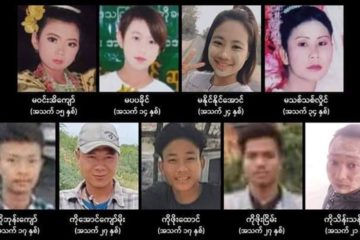
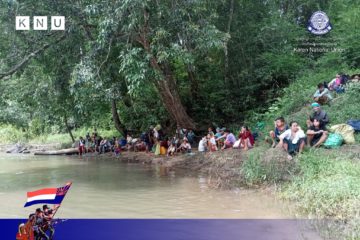
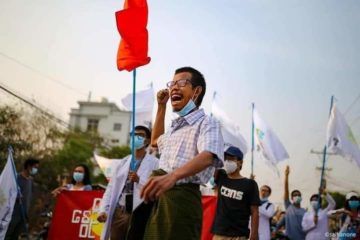
0 Comments